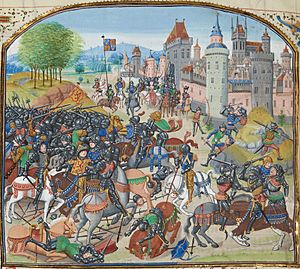John de Coupland facts for kids
John de Coupland (died 1363), also known as John Copeland, was a brave soldier from Northumberland in England. He became famous for capturing David II of Scotland after a big battle called the Battle of Neville's Cross in 1346. For this important act, he was made a knight and became a powerful person in northern England. However, he also made many enemies because he was very keen on gaining more power. He was attacked and killed in 1363.
Capturing King David II
John de Coupland captured King David II right after the Battle of Neville's Cross on October 16, 1346. Stories say that King David was badly hurt, with two arrows in his head. But he still tried to fight Coupland and even knocked out two of Coupland's teeth!
After capturing the king, Coupland rode about 15 leagues (a long distance) to a castle in Ogle. There, he kept his important prisoner safe. When Queen Philippa heard that King David was captured, she asked Coupland to bring him to her right away.
But Coupland refused! He said he would only give his prisoner to the King of England himself. Queen Philippa then wrote to King Edward III, who was in Calais, to tell him what Coupland had done. The king then called Coupland to come to Calais. Coupland made sure King David was secure in a castle, then rode to Dover and sailed to Calais.
When Coupland met King Edward, he explained that he didn't mean to upset the Queen. He said his promise was only to the King. King Edward understood that Coupland's brave act was more important than his refusal to the Queen. He told Coupland to go back to England and give King David to the Queen.
The King then gave Coupland a big reward. He made him a knight banneret, which was a special kind of knight. He also gave him £500 a year for the rest of his life. Plus, he gave him £100 for staying with the King with 20 armed men. Coupland then went back to England, gathered his men, and took King David to the Queen in York. The Queen was happy and sent King David to be held prisoner in the Tower of London. King David stayed a prisoner of war for eleven years.
Coupland's Important Roles
Records show that Coupland worked for the King as early as 1339. He was given £20 each year for his service. He continued to work for the King after capturing King David II.
From 1347 until he died, he was the Constable of Roxburgh Castle. This meant he was in charge of the castle. He was also the Sheriff of Roxburghshire. For much of that time, the English didn't control all the land around Roxburghshire, only the castle. So, his title was mainly for the castle itself.
Here are some other important jobs he had:
- He was in charge of Berwick-on-Tweed from 1357 to 1362.
- He was the Escheator for Northumberland county in 1354 and 1356. An Escheator was someone who managed land that went back to the King.
- He was the Sheriff of Northumberland in 1350, 1351, 1353, 1354, and 1356. He also had King David in his care in 1351, 1352, 1353, and 1356.
- He was a Deputy Warden of the East March in 1359.
Sometimes there were breaks in his service, which might mean Coupland had some problems. But he was never publicly shamed. Records also show that after capturing King David, John and his wife Joan became very big landowners in northern England, especially near the Scottish border.
How Coupland Died
On December 20, 1363, Coupland was attacked and killed while crossing Bolton Moor. Nine of the attackers had spears, and eleven were archers (bowmen). The King ordered an investigation to find out why Coupland was attacked and to arrest the killers.
The investigation named several people who were involved, including John de Clifford and Thomas de Clifford. It was decided that the attack was planned beforehand. However, the reason for the attack was not known for sure. Everyone involved was thought to have run away to Scotland, so they were not arrested.
The King ordered another investigation the next year to try and catch the killers again. This led to the arrest of people who helped the murderers. But they were let go after paying money to the King. A third and final investigation looked into crimes across all of Northumberland. This led to more fines for the King and pardons for most people. However, those who committed treason or killed John de Coupland were not pardoned. The killers were never caught, and people still wonder why Coupland was killed.
Coupland certainly had many enemies in northern England. One historian, Michael A. Penman, wrote that Coupland was very determined to get more land, money, and power. This made him a tough person. The English King sometimes had to replace him in his jobs because people complained about him. Coupland had also argued with William, the Earl of Douglas, since 1353. He was especially angry when the Earl took over Selkirk forest and Hermitage Castle.
King David had recently been released and gone back to Scotland. Coupland did not want peace with Scotland. He was seen as someone who benefited from war. Penman suggests that King David might have been involved in Coupland's death. Coupland would have needed to be "quieted down" or "removed" to make sure a peace deal could happen.
In Literature
As "John Copland," he appears in an old play from the time of Queen Elizabeth I called Edward III. In the play, he gives speeches defending his honor as a knight.
 | Jackie Robinson |
 | Jack Johnson |
 | Althea Gibson |
 | Arthur Ashe |
 | Muhammad Ali |


